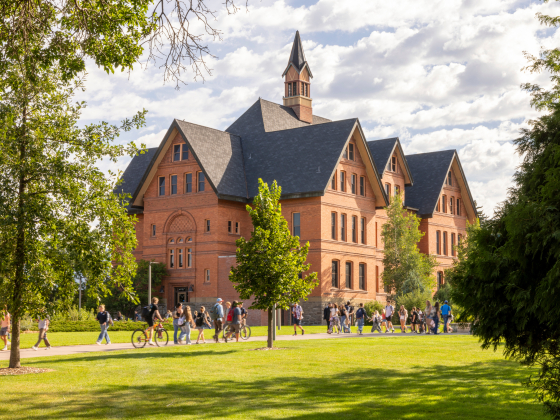BOZEMAN — A new six-year, $3 million grant-funded project at Montana State University will support dozens of science, technology, engineering and math teachers in rural and underserved areas of Montana as they work toward graduate degrees in science education or deepen their expertise as teachers. The project ultimately aims to strengthen STEM education for students in rural areas of the state.
The grant comes from the National Science Foundation’s Robert Noyce Teacher Scholarship Program, which works to support STEM teachers.
“We’re very excited about this project,” said Fenqjen Luo, associate professor in the Department of Education and associate director of the Science Math Resource Center at MSU, who is the grant’s principal investigator. “All project participants will be supported financially, which helps retain great teachers in high-need districts.”
The project – known as Rural and American Indian School Educators as Science, Technology, Engineering, and Mathematics Leaders, or RAISE STEM Leaders – will develop a group of 26 experienced and exemplary STEM teachers, known as Master Teacher Fellows, from seven high-need school districts in rural and American Indian communities across Montana, including Browning, Colstrip, Cut Bank, Hardin, Polson, Pryor, Ronan, St. Labre and Superior.
Program participants attend monthly networking events and STEM professional development conferences, including the MFPE Educator Conference. They also participate in a weeklong STEM Summer Institute and STEM Leadership Academy every summer on the MSU campus. Participants are eligible to receive a stipend of $12,000 per year for up to five years to fulfill their teaching service commitment and STEM leadership activities, as well as to fund their master’s degrees through MSU’s Master of Science in Science Education program and for costs related to program participation.
“Our Master Teacher Fellows will strengthen their leadership competence in STEM education, integrate funds of knowledge and culturally responsive and sustaining pedagogy into STEM curriculum and instruction, and lead in designing and facilitating formal and informal STEM activities within their schools and communities to elevate student attitudes, behaviors and achievements in STEM,” Luo said.
Kari Hinkle, who is in her seventh year of teaching high school science and chemistry at Cut Bank Schools, was selected as one of the program’s Master Teacher Fellows. She said there is a great need to invest in STEM education in rural and tribal communities in Montana. She hopes that helping students develop interest and aptitude in STEM subjects will lead to more students pursuing careers in those fields.
“Especially in the medical field in rural communities like Cut Bank, there are always more positions open than there are people to fill them,” Hinkle said. “With our community, the goal is to provide a lot of great, authentic educational experiences to students who are here in hopes that they will pursue careers as doctors and nurses and EMTs and fill some of those open positions.”
Hinkle, who was an NSF Noyce Scholar as an undergraduate student at the University of Montana, said she was eager to apply to the RAISE STEM Leaders program.
“The experience I had (as an undergraduate Noyce Scholar) really helped to advance my education as a STEM teacher, and I expect this program will do the same,” Hinkle said, noting that her earlier Noyce Scholar experience provided numerous opportunities to gain teaching experience and that the financial support was also valuable.
Polly Dupuis, who teaches math to high school students in Polson, was also selected as a Master Teacher Fellow. She said she joined the RAISE STEM Leaders project because she is passionate about supporting and elevating STEM education within Indigenous communities.
“Working with pre-service and in-service teachers on a tribal reservation, I’ve seen firsthand the impact of culturally relevant STEM teaching practices,” Dupuis said. “Additionally, the RAISE STEM mission aligns with my goal to foster a community of teachers and learners across the state and provide professional development that helps educators strengthen their STEM skills, refine teaching practices, and create meaningful, inclusive learning experiences for students.”
RAISE STEM Leaders is housed in MSU’s College of Education, Health and Human Development’s Science Math Resource Center and Department of Education. MSU partners include the College of Letters and Science’s Master of Science in Science Education (MSSE) Program and Department of Physics and the Norm Asbjornson College of Engineering’s Chemical and Biological Engineering Department. Additional partners include the Museum of the Rockies, School Services of Montana and Population Connection.

